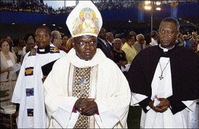Black History Month:Awkward Reflections
Published: Sunday | February 22, 2009

Chisholm
Over the last 500 years, Christianity in Africa and in most countries with people of African ancestry has been charged with outright racism (when non-blacks headed the hierarchy within denominations) and with inverse racism (when blacks headed the hierarchy within denominations). To these charges the Church has had to plead 'guilty' or 'guilty with explanation', not, regrettably, by its own volition, but in response to external pressure, not readily, but reluctantly.
The awful reality is that racism and inverse racism are still within sectors of the Christian Church and in societies where Christianity is the dominant religion, like the Caribbean region. To what extent this is true is open to guesswork since, to the best of my knowledge, there has not been any definitive research done on the current levels of racism and especially inverse racism in any country within the Caribbean.
There is no question that there are residual negative effects of the chattel slavery experience in the region today. Black people have had to struggle with a culturally entrenched notion of white supremacy that has adversely affected their psyche. There has been, and there still is a need for a thorough programme of self-affirmation as blacks learn to be at ease with themselves.
The enterprise of afrocentricity - an enterprise involving a refocussing of the Black person's psyche on things African - is designed in part to remind blacks of their roots in Africa and the proud historical and historic achievements of their ancestors.
Black enterprise
Black consciousness is an enterprise that can be seen as intimately related to afrocentricity if not identical with it. The differentiating nuance, if any, is that black consciousness deals specifically with the need for pride in one's black skin while sharing with afrocentricity the concern to refocus the black psyche on things African.
Where there is evidence that black people are not at ease concerning who they are, there is going to be a need to assist such persons in improving their sense of ethnic identity and ethnic worth. This assistance, if accepted, will result in pride in the particularity of one's ethnic identity.
It must be realised though that there are black persons who are very proud of their ethnic identity, but do not deem it necessary to wear anything special or speak in any particular way to show that they are proud of their ethnic identity. Nor do they see the need to be, in principle, against any other ethnic stock.
If there is genuine pride in ethnic particularity, plain and simple, there can be no place for denouncing those who are not so vocal or even ambivalent about ethnic issues. Nor should we indulge or defend the practice of calling such persons by derogatory terms as 'roast breadfruit' or 'coconut'. Is my ethnicity or my skin colouration the essence of me?
awkward issue
Here now is an awkward issue which must be faced. Why should there be any greater virtue in preferring one's skin colour or craniofacial features over say one's height, weight, brain-power or character? If I can, defensibly, have a certain brain, height, weight or character and yet prefer another kind of all or any of these, what is so wrong with having a certain skin colour and preferring another kind, especially given the wide spectrum of skin colourations qualifying as black?
If what I am raising here has any probative value it means that we need to be more careful in our tendency to conclude that black people who 'bleach' their skins - health concerns aside-are necessarily suffering from inverse racism. They might just be desirous of a lighter or 'high brown' but still black skin, for aesthetic or economic or other defensible reason.
What I am calling for in this lecture is care in how we execute this necessary double-edged programme of afrocentricity and black consciousness.
Rev Clinton Chisholm is a Jamaican theologian. Feedback may be sent to clintchis@yahoo.com

Archbishop of York John Sentamu (centre) enters the National Arena October 2007 with chaplains the Reverend Major Sirrano Kitson (right) and the Reverend Rose Hudson-Wilkin while a big audience looks on. - file
